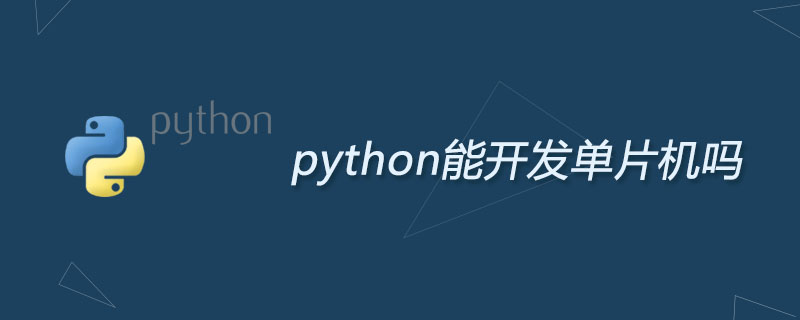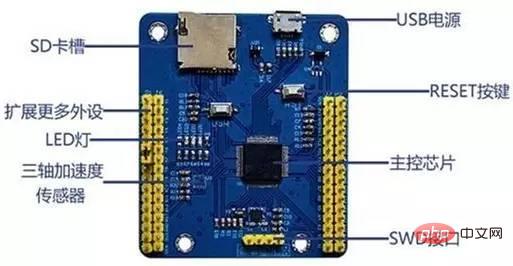
Python has gradually become a "guest" of popular programming languages. At the same time, it is also a scripting language that is relatively easy to use and has strong community support. Some people who are not computer professionals choose it as an introductory language.

Therefore, MicroPython, which applies Python to the embedded field, emerged. MicroPython was born out of Python, based on ANSIC (C language standard), and then in terms of syntax It also follows the Python specifications, mainly to make it easier to implement underlying operations on embedded hardware (here specifically at the microcontroller level). Up to now, many embedded hardware have successfully transplanted Micropython, such as pyboard, esp8266, WiPy, Espruino Pico, STM32F4 Discovery, etc. (Recommended learning: Python video tutorial)
PYBoard is the official development board of MicroPython, but this board is priced higher and has not been well popularized in China. This also leaves many makers who love MicroPython struggling. Fortunately, MicroPython is open source under the MIT license. We can run MicroPython well on other development boards, and the effect is even worse.
TPYBoard’s MicroPython development board series is currently the most comprehensive and professional in China. In addition to the TPYBoardV101, V102, V201, V202, and V702 that support MicroPython, the existing products also include the stm23F4 minimum system board. The arduino series development boards, etc., are the best choice for MicroPython from entry to proficiency, and are also good teachers and helpful friends for the majority of makers on their journey to learn hardware.
TPYBoardv102 is the first product of TPYBoard's MicroPython development board series. In addition to v102, the TPYBoard series also includes v202 that supports 8266, v201 that supports Ethernet, and v702 that supports GPS Beidou & GPRS communication functions. Once the product comes out It has also received support and love from the majority of makers.
Version:
In order to allow the majority of makers to experience the charm of MicroPython development better and more flexibly, TPYBoardv102 is now divided into two versions, each compatible with MicroPython The official boards PYBoardv1.0 and PYBoardv1.1 are also equipped with a pinless version. Fans can choose according to their own needs.
Appearance article:
TPYBoardv102 is very compact, the motherboard is blue immersed gold, the size is 64mm*54mm, the portability is very good, you can carry it with you and you can develop anywhere . The official price of PYBoard is 28 pounds, while the price of TPYBoardv102 starts at 108 yuan, which is only half the price of the official board, but it is functionally perfectly compatible with PYBoardv1.0 and v1.1 firmware.

Basics:
Through TPYBoardv102, users can easily control the microcontroller, which allows more Computer beginners can also do hardware DIY. Users can completely access and control the underlying hardware through MicroPython language, such as controlling LED light bulbs, LCD displays, reading voltages, controlling motors, accessing SD cards, etc.
Industrial Chapter:
A machinery manufacturing company in Guangzhou used the TPYBoardv102 development board to independently develop and complete the R&D and production of automatic kraft paper packaging machines. Based on the TPYBoard development board, it has ADC It has the characteristics of high-precision conversion, super timer function, reasonable and abundant IO port structure, etc., and was selected as the main control. It is mainly responsible for automatic temperature control, automatic correction, interaction with Weilun touch screen, inverter monitoring, heat dissipation control, etc.
For more Python related technical articles, please visit the Python Tutorial column to learn!
The above is the detailed content of Can python develop microcontrollers?. For more information, please follow other related articles on the PHP Chinese website!